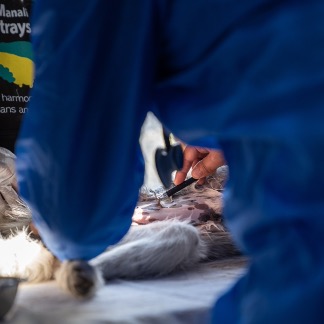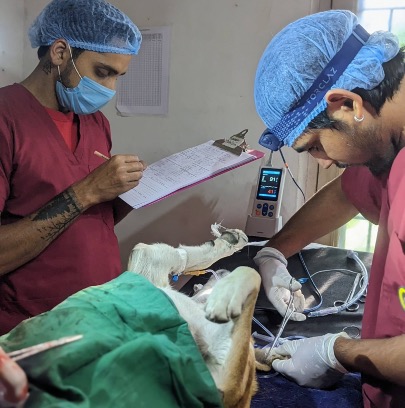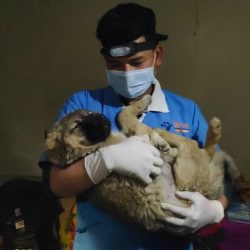Animal Birth Control - what is it?
Animal Birth Control (ABC) programs are the worldwide standard, and only proven scientific method, for controlling the population of dogs and cats.
It involves sterilising an animal so that it is unable to reproduce. In males, the testes are removed, and in females, the uterus and/or ovaries are removed.
Why not just poison the stray dogs?
This may seem like a ridiculous question to most people, but sadly it is still the attitude of many.
Over the years, various methods have been used in an attempt to control stray dog populations. For example, poisoning, shooting, beating to death, and electrocuting. However, evidence shows that these methods are ineffective and extremely inhumane.
People do not seem to understand that:
The dogs that get poisoned are usually the friendly non-fearful dogs. The dogs that are scared and more likely to bite, hide away and will not take poisoned food from people.
Culling has a negative impact on anti-rabies programs. This is because the poisoned dogs are usually vaccinated and quickly replaced by unvaccinated dogs from different areas looking for the best resources and territory.

The friendliest dogs are usually the ones unfortunate enough to be the victims of poisoning.
Why Animal Birth Control programs are a better solution
Culling results in an immediate, but temporary, reduction in numbers, but the remaining dogs continue to reproduce. Whereas, sterilisation prevents many puppies from being born. On average, a single female is able to give birth to eight puppies twice a year. So, in a 10-year lifespan, she could have 160 puppies. And if each of the female puppies reproduces, and so on, it is estimated that a single female gan give rise to up to 67,000 dogs in their lifetime.
Many studies have compared and evaluated the effects of animal birth control versus culling. The results have shown that culling has a small effect over a short-term, but sterilisation has far larger impacts in the long-term.
Sterilisation also has many health-benefits to the dogs, resulting in a stable and healthier population of street dogs. Health benefits include:
- Reducing the risk of various cancers in both males and females.
- Preventing pyometra (infection of the uterus) in females.
- Preventing the spread of TVT (a sexually transmitted cancer) in males and females.
- Minimising males fighting over females in heat.
How Manali Strays tackles the problem
Sterilisation of Strays and Pets
When we rescue a stray dog for medical reasons, we always try and sterilise them once they have recovered. Puppies (younger than five months) are not sterilised at the time of release, but we sterilise them at a later date when they are old enough.
We also offer sterilisation to pet parents so that their pet can experience the many benefits associated with not being driven by the biological instinct to reproduce.

Animal Birth Control Camps
Manali Strays carries out Animal Birth Control camps across the Kullu district and beyond.
This involves travelling to individual villages around and setting up a short-term camp to sterilise a set number of dogs.
If you are interested in having a camp in your village, please contact us to discuss the arrangements and requirements.
Phone/Whatsapp: +91 94187-04924
Email: help@manalistrays.org

Previous Animal Birth Control Camps
New Manali - November/December 2019

This was our very first ABC camp, and was made possible with the support of the local government (SDM and Tehsildar) at the time. We sterilised, and vaccinated against rabies, 108 dogs from around Mall road, New Manali.
NTPC Koldam, Bilaspur - March 2020

We were approached by the National Thermal Power Corporation to sterilise dogs at their Hydro power campus in Koldam. We successfully sterilised 64 dogs, with the help of campus residents feeding and catching the friendlier dogs.
Naggar - June 2021

This camp was requested and generously funded by Om Ashram International Yoga & Welfare Society. A total of 41 dogs were sterilised over a period of fve days.
Patlikhul - December 2021

The local residents of Patlikhul town contributed towards the cost of sterilising 56 dogs. The camp was requested by one of the residents, who also carried out fundraising within the town towards the cost.
Project Valley Dogs - October 2022

We teamed up with Delhi-based organisation Neighbourhood Woof to sterilise 101 dogs that live on the stretch of road between Khaknal and Naggar. This was an important camp, as it covered the areas immediately surrounding Manali Strays’ rescue centre.
Keylong - April 2023

Although not technically in the district of Kullu, we travelled 80 km to Keylong, which is located in the next district of Lahaul & Spiti. We carried out this camp on request of several individuals and the Panchayat of Kelong. We sterilised a total of 81 dogs.
Manali - June 2023

In response to some poisonings that had occurred a few months previously, we set up our second camp in Manali. This time we sterilised 120 dogs before the monsoon forced us to halt.
Kullu - October 2023

Upon the request of the MC of Kullu, this was the first camp of its kind in the district’s capital. With funding for 100 dogs, we hope this is the first of many to tackle the large number of street dogs in Kullu town.
The cost to sterilise one dog is 2000–3000 INR ($28/£20 – $40/£30).
This includes: medicines, absorbable sutures, rabies vaccine, dog food for three days, staff wages, & overhead costs.
If you would like to donate towards the cost of sterilising stray dogs so that fewer puppies die from disease, being hit by cars, or drowned, poisoned, etc, then click the yellow button.
